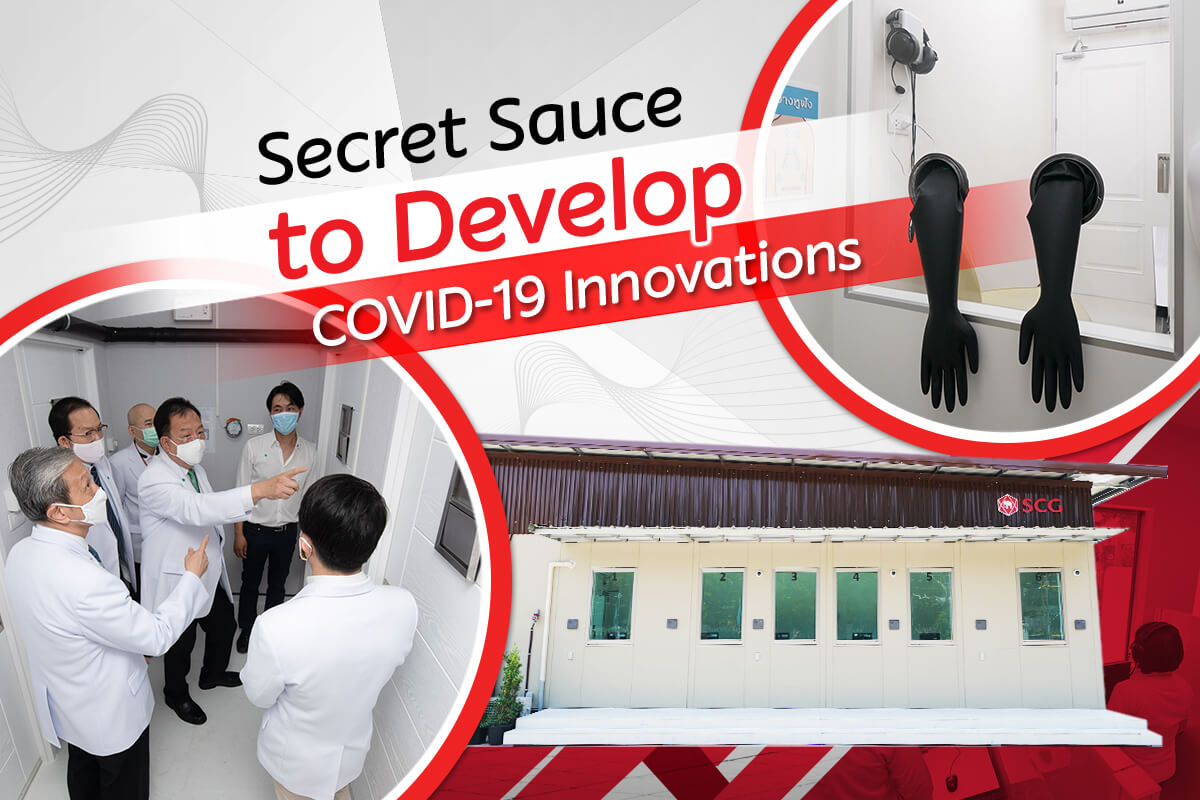The COVID-19 pandemic has affected the lives of people across the globe. The arrival of the virus has brought drastic changes in daily routines where “technology” and “innovation” have played major roles in controlling and preventing the spread of the virus, as well as bringing convenience to all walks of life. To overcome the virus, healthcare workers – the frontline workers – must be sufficiently armed to undertake this difficult quest in a race against time while keeping themselves safe from the patients’ transmission. “SCG” is among organizations that are ready to exert its expertise, innovations, and technologies in a collaboration with doctors to speed up developing a diverse series of COVID-19 innovations. The efforts seek to fulfill the needs in a timely fashion to reduce infection risks among healthcare workers and help Thailand overcome this crisis.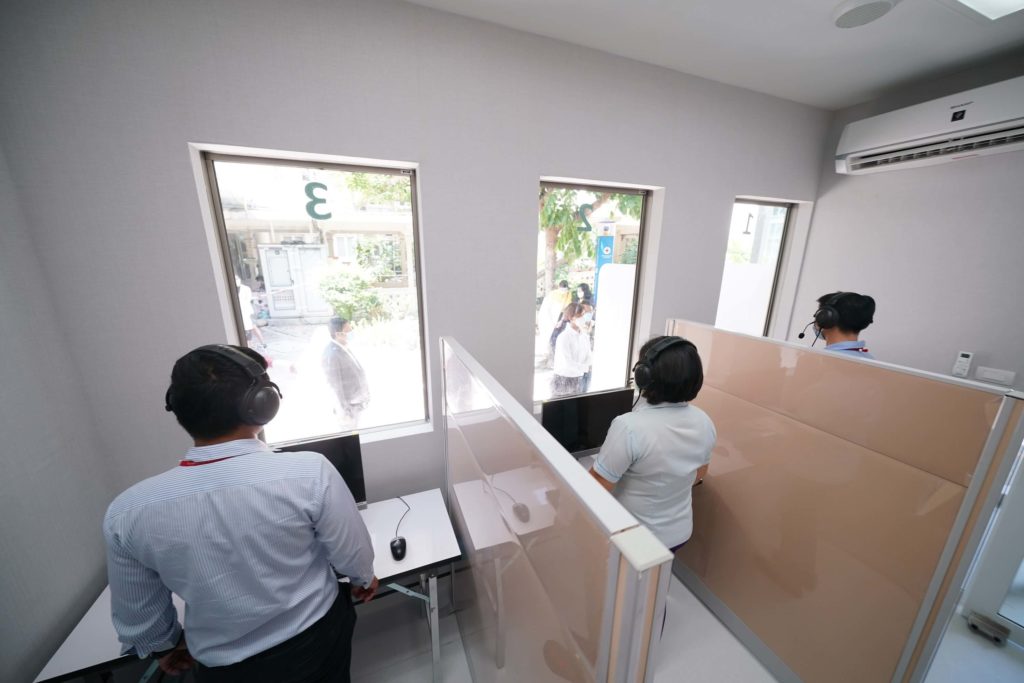 “There were more infected people each day. We have to work and race against the clock. And who will take care of us if doctors also get infected? SCG has technologies, and we are in a state of readiness, where we can move fast. Even though the mission is costly but as we are part of society and we can do it faster than anyone, we decided to go for it. We start putting our hands to work and developing innovations to mitigate infection risks among healthcare workers. We have a certain level of experience in health-related areas. We know many people in this industry, and we have some experts to advise on solutions and technologies. Everything perfectly came together, and this has brought about the development of the Negative Pressure Chamber. We initially planned to provide these chambers to 20 hospitals in Bangkok, but now, they have been installed in many hospitals,” said Roongrote.
“There were more infected people each day. We have to work and race against the clock. And who will take care of us if doctors also get infected? SCG has technologies, and we are in a state of readiness, where we can move fast. Even though the mission is costly but as we are part of society and we can do it faster than anyone, we decided to go for it. We start putting our hands to work and developing innovations to mitigate infection risks among healthcare workers. We have a certain level of experience in health-related areas. We know many people in this industry, and we have some experts to advise on solutions and technologies. Everything perfectly came together, and this has brought about the development of the Negative Pressure Chamber. We initially planned to provide these chambers to 20 hospitals in Bangkok, but now, they have been installed in many hospitals,” said Roongrote. 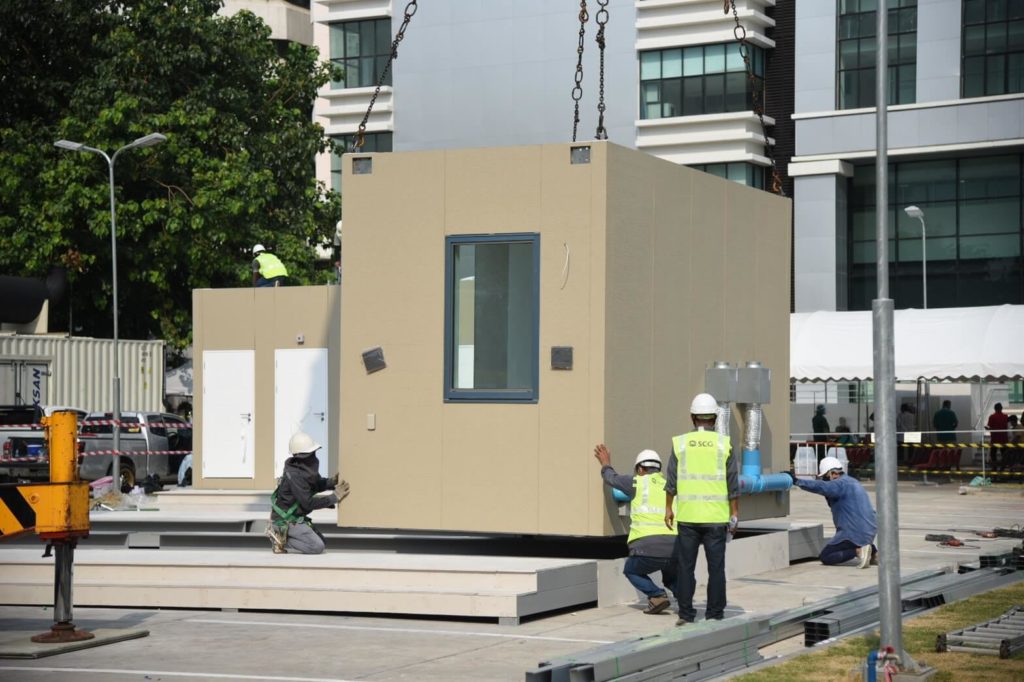 Mr. Wachirachai Koonamwattana, Head of Living Solution Business of Cement-Building Materials Business, SCG added, “The pace of the work accelerated after we receive a nod from the SCG management. We formed a team immediately because everyone knew that we were racing against time. The healthcare workers are frontline workers who have put their lives at risk every day. This came at the time when the medical protective gear was running short, driving them in a state of low morale. After studying medical practices and having discussions, we understood the situations better, and we were fueled to develop it as fast as possible. It has become a new normal norm where things must be achieved faster. It took less than a week to get a conceptual idea and about 2-3 months to produce and deliver our units to 34 hospitals.”
Mr. Wachirachai Koonamwattana, Head of Living Solution Business of Cement-Building Materials Business, SCG added, “The pace of the work accelerated after we receive a nod from the SCG management. We formed a team immediately because everyone knew that we were racing against time. The healthcare workers are frontline workers who have put their lives at risk every day. This came at the time when the medical protective gear was running short, driving them in a state of low morale. After studying medical practices and having discussions, we understood the situations better, and we were fueled to develop it as fast as possible. It has become a new normal norm where things must be achieved faster. It took less than a week to get a conceptual idea and about 2-3 months to produce and deliver our units to 34 hospitals.” 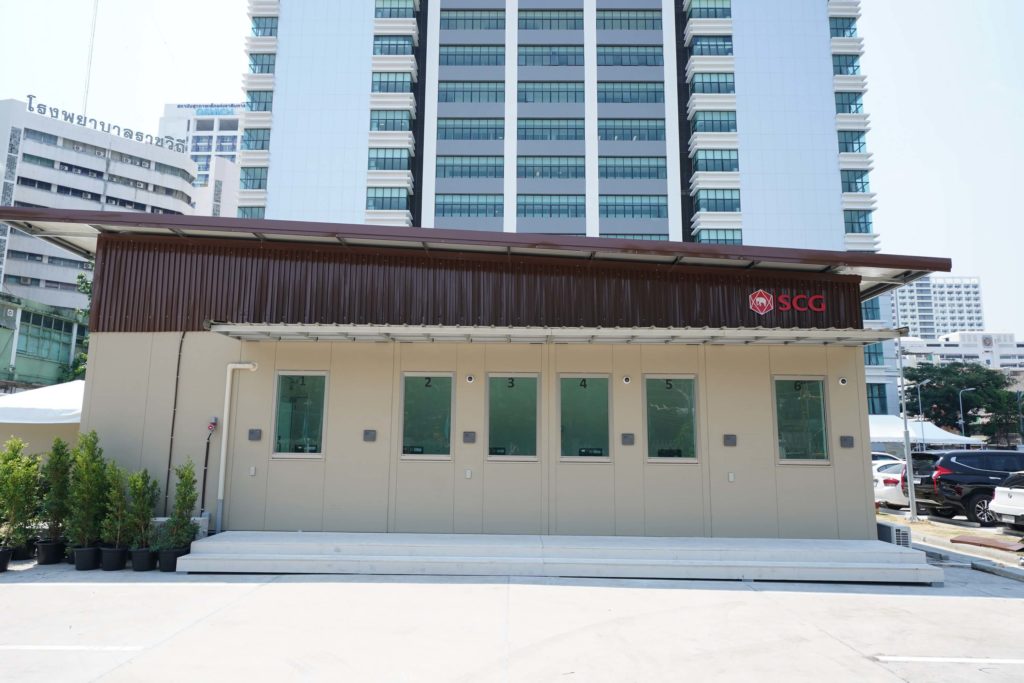
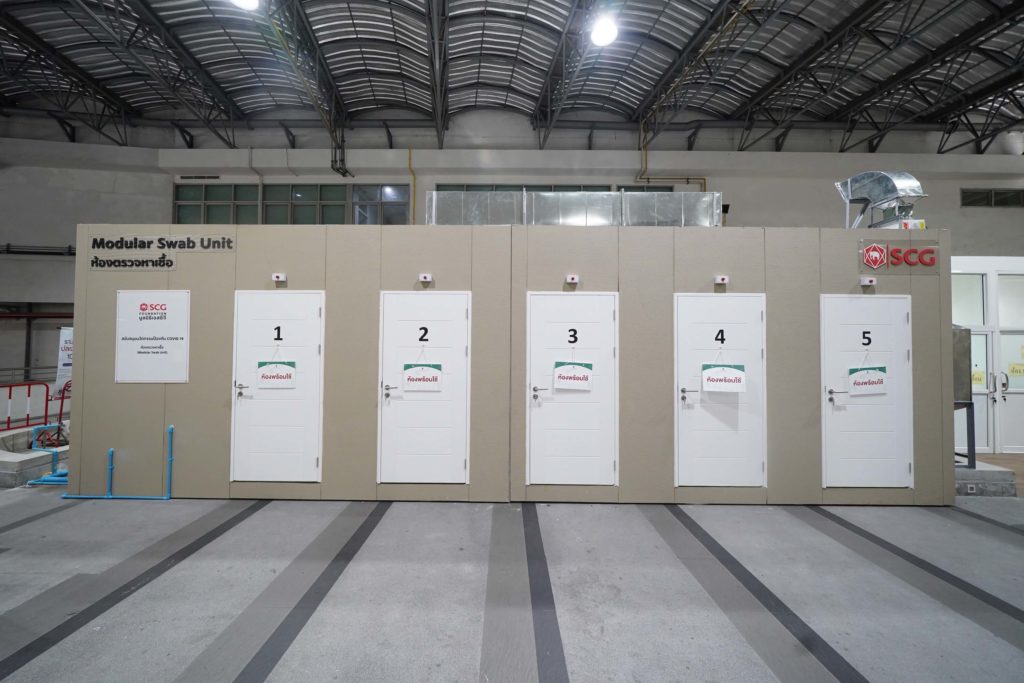 “Amid the severe disruption of COVID-19, I imagined that we could have an emergency crisis like Wuhan in China. How much is Thailand ready to build a field hospital with a thousand beds so quickly. I guessed only a few big corporates could do that, and SCG was among the top of mind. At first, I couldn’t figure out how SCG can help out. I didn’t know what should be built or how to build it. I can only say that everything has to be in sync. Doctors have no idea about engineering, and engineers have no idea about medical practices. We have to integrate, brainstorm and exchange, and then we eventually agreed that we should develop the Negative Pressure Chamber to isolate the infected patients and block the contaminant air along with the connected Positive Pressure Room. I invited the SCG team to see how the system works in the hospital and how we can expand it into something greater. Generally, building such a unit takes some time, but in this time of crisis, we have to move fast and race against time,” said Prof. Yong.
“Amid the severe disruption of COVID-19, I imagined that we could have an emergency crisis like Wuhan in China. How much is Thailand ready to build a field hospital with a thousand beds so quickly. I guessed only a few big corporates could do that, and SCG was among the top of mind. At first, I couldn’t figure out how SCG can help out. I didn’t know what should be built or how to build it. I can only say that everything has to be in sync. Doctors have no idea about engineering, and engineers have no idea about medical practices. We have to integrate, brainstorm and exchange, and then we eventually agreed that we should develop the Negative Pressure Chamber to isolate the infected patients and block the contaminant air along with the connected Positive Pressure Room. I invited the SCG team to see how the system works in the hospital and how we can expand it into something greater. Generally, building such a unit takes some time, but in this time of crisis, we have to move fast and race against time,” said Prof. Yong. 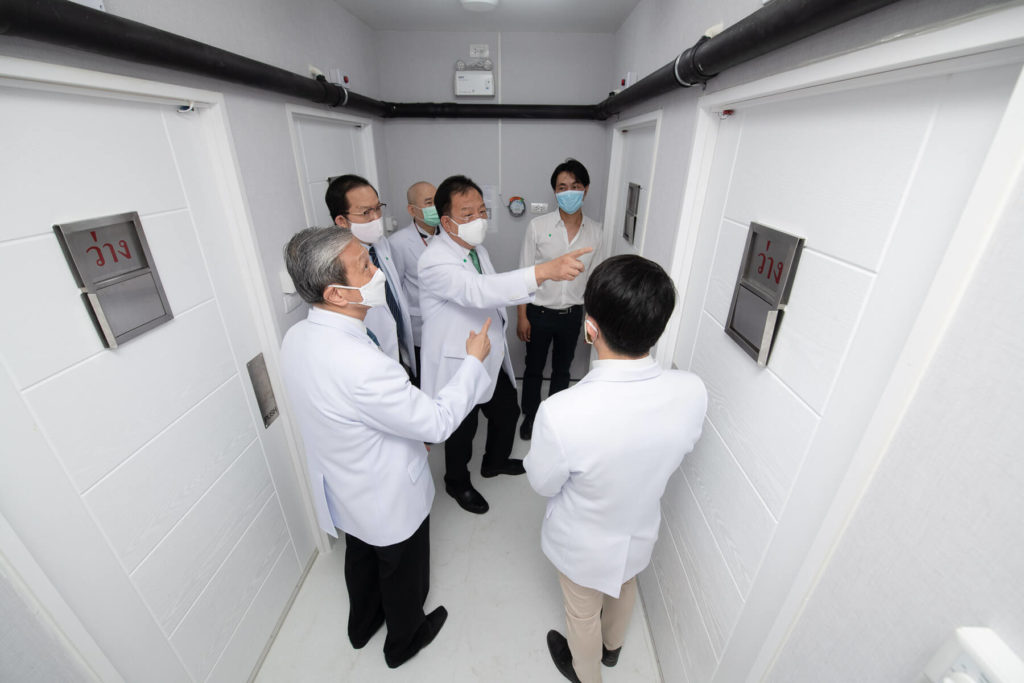
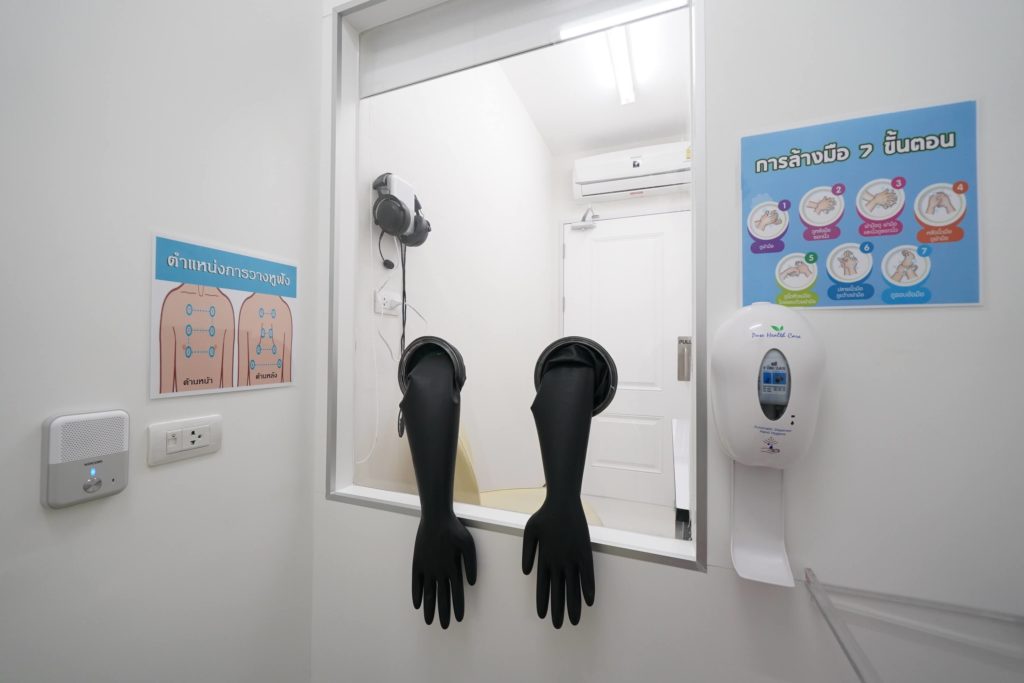
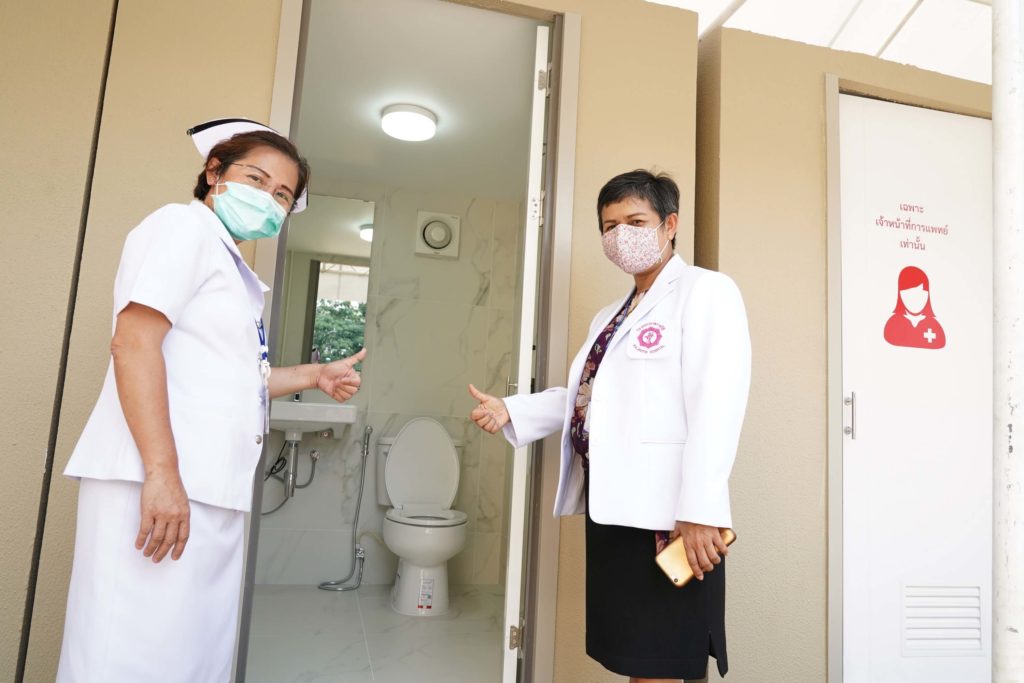 Prof. Yong added that the situation has led to valuable developments. Examples include Biosafety unit under a negative pressure environment, in which the facility in Thailand is mainly at level 3. With SCG’s readiness and expertise in negative pressure control and ventilation system, such unit at level 4 could be developed where SCG can commercialize it as now Thailand still procures from foreign companies. This is good progress where Thai people can now build technologies, and if a similar situation occurs in the future anywhere, SCG can be a part of it.
Prof. Yong added that the situation has led to valuable developments. Examples include Biosafety unit under a negative pressure environment, in which the facility in Thailand is mainly at level 3. With SCG’s readiness and expertise in negative pressure control and ventilation system, such unit at level 4 could be developed where SCG can commercialize it as now Thailand still procures from foreign companies. This is good progress where Thai people can now build technologies, and if a similar situation occurs in the future anywhere, SCG can be a part of it.
An Origin of Innovation and A Race Against Time
Mr. Roongrote Rangsiyopash, President and CEO of SCG said that SCG has continuously put a tremendous emphasis on innovation development. Over the years, the main focus of SCG had been to deliver solutions to improve consumers’ lives. However, amid the severe COVID-19 pandemic, the healthcare workers’ strenuous efforts in the fight against the pandemic in a state of high infection risk have contributed to a fundamental shift in focus towards creating solutions to safeguard healthcare workers from the process of screening to treatment. The mission goal is based around “speed” as time significantly matters due to the virus’s rapid spread. “There were more infected people each day. We have to work and race against the clock. And who will take care of us if doctors also get infected? SCG has technologies, and we are in a state of readiness, where we can move fast. Even though the mission is costly but as we are part of society and we can do it faster than anyone, we decided to go for it. We start putting our hands to work and developing innovations to mitigate infection risks among healthcare workers. We have a certain level of experience in health-related areas. We know many people in this industry, and we have some experts to advise on solutions and technologies. Everything perfectly came together, and this has brought about the development of the Negative Pressure Chamber. We initially planned to provide these chambers to 20 hospitals in Bangkok, but now, they have been installed in many hospitals,” said Roongrote.
“There were more infected people each day. We have to work and race against the clock. And who will take care of us if doctors also get infected? SCG has technologies, and we are in a state of readiness, where we can move fast. Even though the mission is costly but as we are part of society and we can do it faster than anyone, we decided to go for it. We start putting our hands to work and developing innovations to mitigate infection risks among healthcare workers. We have a certain level of experience in health-related areas. We know many people in this industry, and we have some experts to advise on solutions and technologies. Everything perfectly came together, and this has brought about the development of the Negative Pressure Chamber. We initially planned to provide these chambers to 20 hospitals in Bangkok, but now, they have been installed in many hospitals,” said Roongrote.  Mr. Wachirachai Koonamwattana, Head of Living Solution Business of Cement-Building Materials Business, SCG added, “The pace of the work accelerated after we receive a nod from the SCG management. We formed a team immediately because everyone knew that we were racing against time. The healthcare workers are frontline workers who have put their lives at risk every day. This came at the time when the medical protective gear was running short, driving them in a state of low morale. After studying medical practices and having discussions, we understood the situations better, and we were fueled to develop it as fast as possible. It has become a new normal norm where things must be achieved faster. It took less than a week to get a conceptual idea and about 2-3 months to produce and deliver our units to 34 hospitals.”
Mr. Wachirachai Koonamwattana, Head of Living Solution Business of Cement-Building Materials Business, SCG added, “The pace of the work accelerated after we receive a nod from the SCG management. We formed a team immediately because everyone knew that we were racing against time. The healthcare workers are frontline workers who have put their lives at risk every day. This came at the time when the medical protective gear was running short, driving them in a state of low morale. After studying medical practices and having discussions, we understood the situations better, and we were fueled to develop it as fast as possible. It has become a new normal norm where things must be achieved faster. It took less than a week to get a conceptual idea and about 2-3 months to produce and deliver our units to 34 hospitals.” 
Collaboration with Doctors to Gain “Insight” to Truly fulfill Functional Needs
Apart from the race against time, another key goal is to truly fulfill real users’ functional needs. The promising outcome necessitates an integrated system of engineering and medicine. Prof. Yong Poovorawan, M.D., Head of the center of Excellence in Clinical Virology, Faculty of Medicine, Chulalongkorn University, said that one fundamental principle to combat the pandemic is to have a state of readiness. But it appeared that the COVID-19 crisis has led to an insufficient amount of protective gear, attributing to an increased infection risk among healthcare workers. This was the right timing to explain the pandemic situation to SCG executives and staff to prepare for the economic slowdown resulting from the prolonged and deepening crisis. This also included discussion on lowering the infection risks among healthcare workers about the zoning of infected cases. “Amid the severe disruption of COVID-19, I imagined that we could have an emergency crisis like Wuhan in China. How much is Thailand ready to build a field hospital with a thousand beds so quickly. I guessed only a few big corporates could do that, and SCG was among the top of mind. At first, I couldn’t figure out how SCG can help out. I didn’t know what should be built or how to build it. I can only say that everything has to be in sync. Doctors have no idea about engineering, and engineers have no idea about medical practices. We have to integrate, brainstorm and exchange, and then we eventually agreed that we should develop the Negative Pressure Chamber to isolate the infected patients and block the contaminant air along with the connected Positive Pressure Room. I invited the SCG team to see how the system works in the hospital and how we can expand it into something greater. Generally, building such a unit takes some time, but in this time of crisis, we have to move fast and race against time,” said Prof. Yong.
“Amid the severe disruption of COVID-19, I imagined that we could have an emergency crisis like Wuhan in China. How much is Thailand ready to build a field hospital with a thousand beds so quickly. I guessed only a few big corporates could do that, and SCG was among the top of mind. At first, I couldn’t figure out how SCG can help out. I didn’t know what should be built or how to build it. I can only say that everything has to be in sync. Doctors have no idea about engineering, and engineers have no idea about medical practices. We have to integrate, brainstorm and exchange, and then we eventually agreed that we should develop the Negative Pressure Chamber to isolate the infected patients and block the contaminant air along with the connected Positive Pressure Room. I invited the SCG team to see how the system works in the hospital and how we can expand it into something greater. Generally, building such a unit takes some time, but in this time of crisis, we have to move fast and race against time,” said Prof. Yong. 
“Launching Survey” to Gain Users’ Insight
Mr. Wachirachai said that although the company is recognized for developing innovations, this particular quest needs to incorporate the doctors’ expertise to develop an optimized operational system to care for infected cases. The survey to collect data from users can remarkably help visualize the hospital process. As the team was racing against time, it is fortunate that SCG has many resources, know-how, and staff with diverse skills that come into handy to create solutions such as SCG HEIM Modular Home Business. The company has diverse specialized teams focusing on wide-ranging aspects, including indoor climate control, green building, and eldercare architect support who have experienced with hospital projects. As a result, the teams can quickly deliver solutions based on the doctor’s advice, such as the unit’s area zoning where the patients and doctors are completely separated. “We received good advice from Dr. Yong. At the same time, SCG has a team that is well-versed in engineering and ventilation systems. Dr. Yong told us that the said science-based expertise must be integrated with health or medicine. Plus, we received great support from SCG’s board of directors as they put the priority on health. We issued a policy seeking cooperation and align all of our business units: Cement-Building Materials Business, Chemicals Business, and Packaging Business that are related to people’s everyday lives, to work in sync to develop products and provide quick and meaningful solutions. This is a good milestone since the company can expand the knowledge gained from doctors to develop more products, and it can be used to aid other countries.Key of Innovation Development is Technology and Customer Insight
Mr. Roongrote said SCG puts a top priority on research and development (R&D) for its path of innovation development. Besides, it has laid a solid foundation by spending an unlimited budget into collaboration with universities to master technologies and sciences. The team also focuses on seeking to satisfy unmet needs in functional aspects as the academic study may not always provide the right solutions. Recently, SCG has focused on ways to fulfill the gap, provide engineering technical support and experience, and incorporate customer-centricity into solutions. When these three things come together, it will bring about innovation. And SCG has developed itself on this path at a certain level. “Amid COVID-19 crisis, we got to see real demand unleashed, especially the things that are ‘essential.’ COVID-19 has unveiled the real demand, and it has driven a shift in customer priority to wellness and safety. I think what we are doing is valuable to society. On another note, we can use this knowledge to understand consumers better in a more precise way to develop new innovations.”
Expanding to Fulfil Challenging Unmet Needs
Mr. Roongrote said that the SCG would continue to expand to tap health and wellness sectors as the demand for food safety and well-being support will remain stable in the post-COVID-19 era. SCG will tap into this potential market to support food and wellbeing-related industries, such as offering packaging items. These days, people have moved to online food delivery. SCG has combined the collective efforts of all SCG business units, namely Cement-Building Materials Business, Chemicals Business, and Packaging Business, to develop COVID-19 innovations and enable each business unit to see a broader and clearer business landscape, especially Chemicals Business and Packaging Business that provide products revolving around people’s everyday lives. Now, the company can extend the gained knowledge from doctors to develop products that can aid other countries. Apart from using know-how and speed in developing the innovation, another key approach that builds more success is a collaboration with outside partners in which it can establish open innovation and can drive the creation of timely innovations that better to satisfy the demand. Prof. Yong added that the situation has led to valuable developments. Examples include Biosafety unit under a negative pressure environment, in which the facility in Thailand is mainly at level 3. With SCG’s readiness and expertise in negative pressure control and ventilation system, such unit at level 4 could be developed where SCG can commercialize it as now Thailand still procures from foreign companies. This is good progress where Thai people can now build technologies, and if a similar situation occurs in the future anywhere, SCG can be a part of it.
Prof. Yong added that the situation has led to valuable developments. Examples include Biosafety unit under a negative pressure environment, in which the facility in Thailand is mainly at level 3. With SCG’s readiness and expertise in negative pressure control and ventilation system, such unit at level 4 could be developed where SCG can commercialize it as now Thailand still procures from foreign companies. This is good progress where Thai people can now build technologies, and if a similar situation occurs in the future anywhere, SCG can be a part of it. บทความนี้มีประโยชน์หรือไม่ ?
Average rating 0 / 5. Vote count: 0
No votes so far! Be the first to rate this post.

